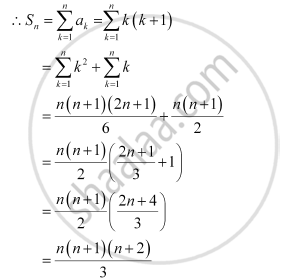Advertisements
Advertisements
प्रश्न
Find the sum to n terms of the series 1 × 2 + 2 × 3 + 3 × 4 + 4 × 5 + …
उत्तर
The given series is 1 × 2 + 2 × 3 + 3 × 4 + 4 × 5 + …
nth term, an = n ( n + 1)

APPEARS IN
संबंधित प्रश्न
Find the sum to n terms of the series 1 × 2 × 3 + 2 × 3 × 4 + 3 × 4 × 5 + …
Find the sum to n terms of the series 3 × 12 + 5 × 22 + 7 × 32 + …
Find the sum to n terms of the series 12 + (12 + 22) + (12 + 22 + 32) + …
Find the sum to n terms of the series whose nth terms is given by n2 + 2n
Find the sum to n terms of the series whose nth terms is given by (2n – 1)2
13 + 33 + 53 + 73 + ...
1.2.5 + 2.3.6 + 3.4.7 + ...
1.2.4 + 2.3.7 +3.4.10 + ...
1 + (1 + 2) + (1 + 2 + 3) + (1 + 2 + 3 + 4) + ...
Find the sum of the series whose nth term is:
2n3 + 3n2 − 1
Find the sum of the series whose nth term is:
n3 − 3n
Find the sum of the series whose nth term is:
n (n + 1) (n + 4)
Find the sum of the series whose nth term is:
(2n − 1)2
3 + 7 + 14 + 24 + 37 + ...
1 + 4 + 13 + 40 + 121 + ...
4 + 6 + 9 + 13 + 18 + ...
\[\frac{1}{1 . 4} + \frac{1}{4 . 7} + \frac{1}{7 . 10} + . . .\]
\[\frac{1}{1 . 6} + \frac{1}{6 . 11} + \frac{1}{11 . 14} + \frac{1}{14 . 19} + . . . + \frac{1}{(5n - 4) (5n + 1)}\]
The value of \[\sum^n_{r = 1} \left\{ (2r - 1) a + \frac{1}{b^r} \right\}\] is equal to
Write the sum of 20 terms of the series \[1 + \frac{1}{2}(1 + 2) + \frac{1}{3}(1 + 2 + 3) + . . . .\]
The sum of 10 terms of the series \[\sqrt{2} + \sqrt{6} + \sqrt{18} +\] .... is
The sum of the series \[\frac{2}{3} + \frac{8}{9} + \frac{26}{27} + \frac{80}{81} +\] to n terms is
3 + 5 + 9 + 15 + 23 + ...
Find the natural number a for which ` sum_(k = 1)^n f(a + k)` = 16(2n – 1), where the function f satisfies f(x + y) = f(x) . f(y) for all natural numbers x, y and further f(1) = 2.
Find the sum of the series (33 – 23) + (53 – 43) + (73 – 63) + … to n terms
Find the sum of the series (33 – 23) + (53 – 43) + (73 – 63) + ... to 10 terms
If |x| < 1, |y| < 1 and x ≠ y, then the sum to infinity of the following series:
(x + y) + (x2 + xy + y2) + (x3 + x2y + xy2 + y3) + .... is ______.
The sum of all natural numbers 'n' such that 100 < n < 200 and H.C.F. (91, n) > 1 is ______.
A GP consists of an even number of terms. If the sum of all the terms is 5 times the sum of the terms occupying odd places, the common ratio will be equal to ______.
The sum `sum_(k = 1)^20k 1/2^k` is equal to ______.
